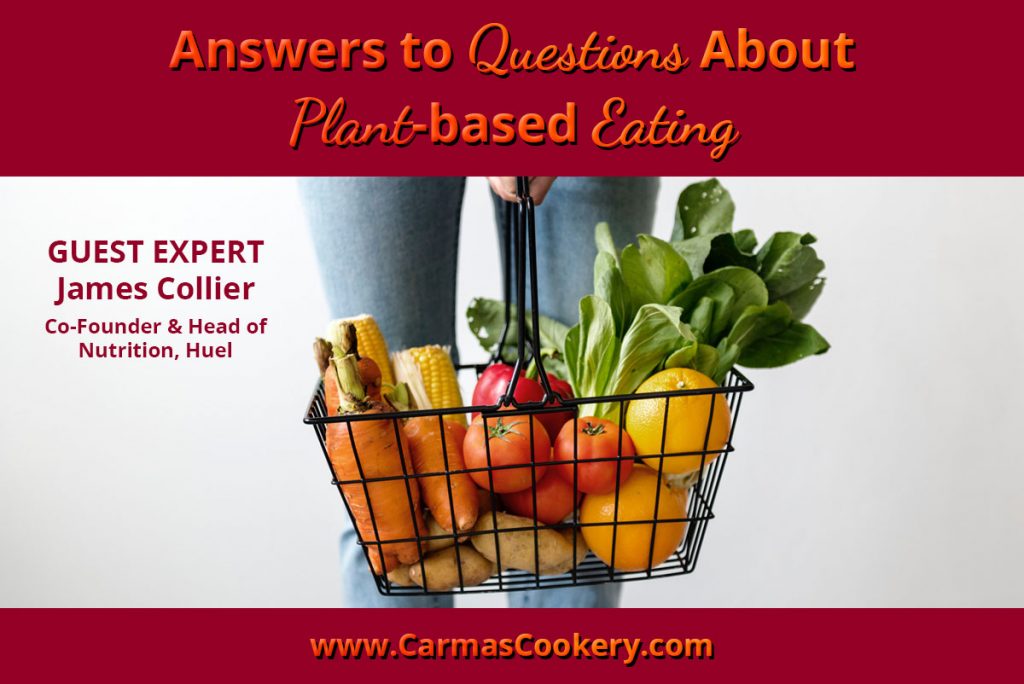Having a diet rich in plant-based sources is becoming increasingly common, especially with younger generations driving the conversation around sustainability. In this post, James Collier, co-Founder and Head of Nutrition at Huel, a nutrition company offering a variety of plant-based powders and ready-to-drink beverages, answers some common questions about plant-based eating.

What is plant-based eating?
A plant-based diet is a diet that consists mainly of foods from plants. Such foods include fruits, vegetables, nuts, seeds, legumes, and whole grains. Meat intake is minimal if any.
There are many reasons why people eat a plant-based diet including environmental, ethical and health concerns. I am not suggesting to eliminate meat from a person’s diet completely, however, reducing meat and animal food consumption is one of the quickest and simple ways an individual can reduce their carbon footprint.
What foods should we eat to achieve daily recommended nutrients, vitamins, minerals on a plant-based diet?
There are some easy ways to ensure, with a plant-based diet, you can get the recommended amounts of all nutrients:
Eat the rainbow.
As different color foods usually contain different levels of nutrients, it’s important to eat a variety. For example, the phytonutrient, lycopene which is an antioxidant that protects against cell damage and gives tomatoes its red color. While carotenoids, another group of antioxidants, give fruits and vegetables orange and yellow colors, such as carrots.
Get enough Vitamin B12.
Vitamin B12, which plays a vital role in helping the body produce red blood cells can usually be perceived as tricky to get enough of with a plant-based diet. The good news is, it’s really not. As a start, try incorporating plant-based milks that are that are fortified with B12, and calcium and vitamin D. Cereals, meat alternatives and some soy products are often fortified with B12 too. Taking a B12 supplement also rids any concerns.
Ensure adequate omega-3 consumption.
If oily fish is not part of your eating plan, then foods such as walnuts, soy and flaxseed are ways to ensure adequate omega 3 consumption. Flaxseed is one of Huel’s six main ingredients and contains the omega-3 essential fatty acid ALA. Omega-3 fats are generally low in a Western diet and adequate omega-3 consumption is important to support cardiovascular health.
Keep your iron up.
Iron is not just found in meat food sources. Dark leafy greens, nuts and dried fruits are great sources of iron. Iron is crucial for oxygen transport, cognitive function and the immune system. Iron from plant sources can be harder to absorb, but again, there’s no need to worry. Iron absorption can also be increased by the presence of vitamin C which is found in lots of fruits and vegetables such as oranges and peppers. It’s where the idea of having orange juice with breakfast comes from — to increase the iron that is added to cereals.
How do you transition to plant-based eating?
Whether your motivation to increase plant-based foods to your eating plan is to improve your health or environmental footprint, incorporating higher amounts of plant-based foods can be achievable.
Make small changes over time.
Start by eating one plant-based meal a day. This will be easier to stick with rather than making large, unsustainable changes overnight.
Make some easy fridge swaps.
A good place to start is by swapping dairy milk with almond or oat milk such as Oatly. The rapidly growing plant-based meat industry lead by Beyond Meat and Impossible Foods is also providing shoppers with plenty of options.
Change your mindset.
Instead of thinking, “I can’t eat meat,” think about all the wonderful things you can eat and how beneficial these are for your health (and the planet). Stop focussing on meat as the hero on your plate and rather, build your plate with new and nutritious food choices.
About the Guest Expert
 James Collier is a Registered Nutritionist with 20 years of experience with the national health service in the UK. James is a renowned nutrition expert with over 25 years working in nutrition and dietetics. His experience also includes working in the NHS (UK) as a clinical dietitian covering an array of clinical areas.
James Collier is a Registered Nutritionist with 20 years of experience with the national health service in the UK. James is a renowned nutrition expert with over 25 years working in nutrition and dietetics. His experience also includes working in the NHS (UK) as a clinical dietitian covering an array of clinical areas.
He is also the co-founder of Huel, which has the mission of making nutritionally complete, convenient, affordable food, with minimum impact on animals and the environment. With this in mind, Huel’s products are 100% vegan.

Take Charge of Your Health!
Changing your eating habits can be tough. But it doesn’t have to be if you take a little time to think it out and create a plan.
This Healthy Eating Worksheet will walk you through the process of creating a healthy eating plan. All you need to do is print it out, set aside some time to complete it, and then fill it out. Then you can create your plan, knowing that you have addressed potential obstacles and came up with some creative ways to handle them.


